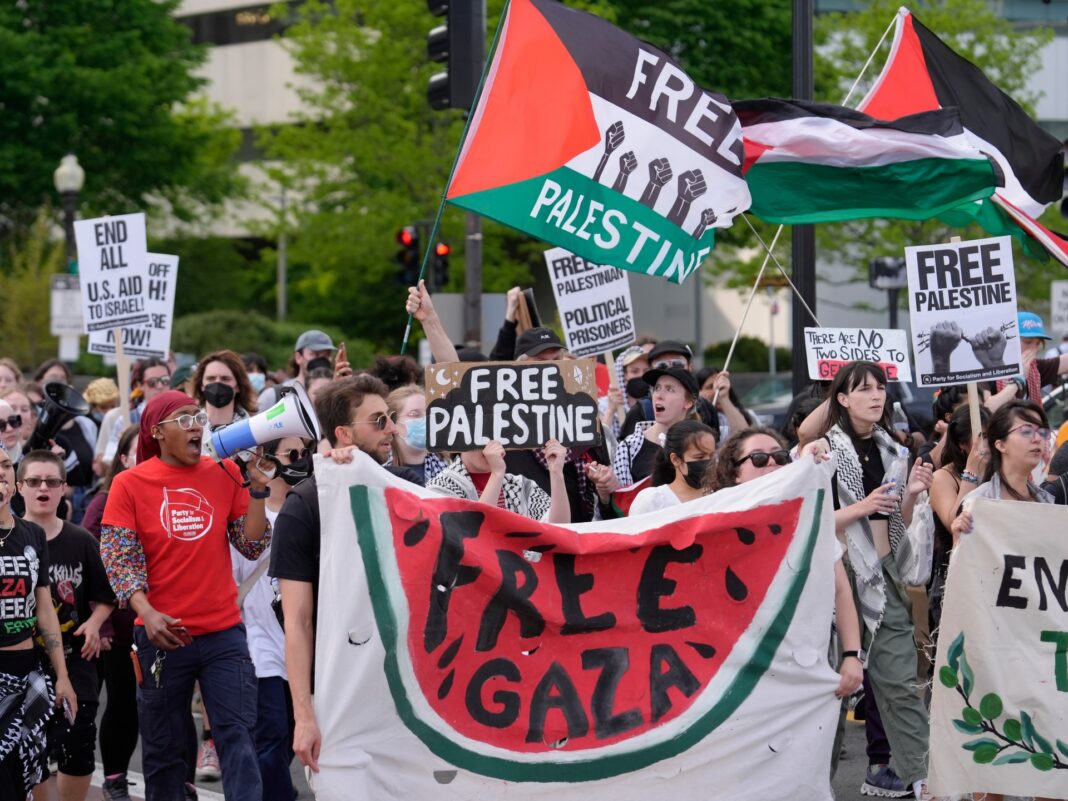Panel says phrase, often used in solidarity with Palestinians, does not violate platform’s hate speech rules.
Meta’s independent oversight board has ruled that the phrase “from the river to the sea”, often used in solidarity with Palestinians, does not in and of itself violate the company’s current policies.
The decision on Wednesday from the panel, which makes final determinations on the platform’s content moderation decisions, followed a review of three posts. It comes amid a wider debate over the phrase, which has been prominently used by protesters in solidarity with Palestinians and against Israel’s nearly 11-month war on Gaza.
It refers to the geographical area between the Jordan River and the Mediterranean Sea, which encompasses Israel, the occupied West Bank and Gaza Strip.
“In upholding Meta’s decisions to keep up the content, the majority of the board notes the phrase has multiple meanings and is used by people in various ways and with different intentions,” the panel said.
“Specifically, the three pieces of content contain contextual signs of solidarity with Palestinians – but no language calling for violence or exclusion,” it added.
The decision was made as the death toll of Palestinians in the war rose to 40,861. The United Nations has said more than 90 percent of the population has been displaced, leading to a humanitarian and health crisis. At least 1,139 people were killed in Israel in the Hamas-led attacks on October 7.
Israeli officials and pro-Israel groups have charged that the phrase is a veiled call for violence and have framed it as an “anti-Semitic” call for Jewish erasure. Nevertheless, some Israeli officials have themselves used versions of the phrase’s geographical reference to call for full Israeli control over the occupied Palestinian territory.
Meta’s oversight board said a minority of board members felt that after the start of the war, the phrase’s use in a post should be presumed to constitute glorification of Hamas – the Palestinian group that led the October 7 attack on southern Israel – and violence “unless there are clear signals to the contrary”.
Palestinians and their supporters have framed the phrase as a call for self-determination and freedom from decades of Israeli occupation and rights for Palestinians living across historic Palestine, a land that is now divided between Israel and the occupied Palestinian territory following the 1948 Nakba, or catastrophe, which resulted in the displacement of hundreds of thousands of Palestinians during the creation of Israel.
Speaking to Al Jazeera in November, Nimer Sultany, a lecturer in law at the School of Oriental and African Studies in London, explained that much of the debate has hinged on the word “free”.
He described the adjective as expressing “the need for equality for all inhabitants of historic Palestine”.
“Those who support apartheid and Jewish supremacy will find the egalitarian chant objectionable,” Sultany, a Palestinian citizen of Israel, told Al Jazeera.
“This continues to be the crux of the problem: the ongoing denial of Palestinians to live in equality, freedom and dignity like everyone else,” Sultany said.
In a statement, Meta said: “We welcome the board’s review of our guidance on this matter.”
“While all of our policies are developed with safety in mind, we know they come with global challenges and we regularly seek input from experts outside Meta, including the Oversight Board,” the company said.







